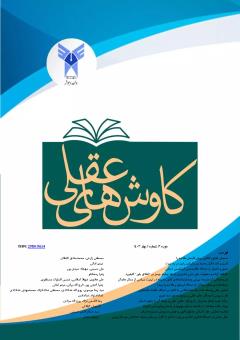تحلیل عقلی واسطه ها در فلسفه اسلامی با تاکید بر دیدگاه علامه طباطبایی
محورهای موضوعی : کاوش های عقلی"
سیدرضا موسوی
1
,
روح اله خدادادی
2
,
مصطفی خدادادنژاد
3
![]() ,
محمدمهدی خدادادی
4
,
محمدمهدی خدادادی
4
1 - استادیار و عضو هیئت علمی گروه معارف اسلامی،دانشکده پزشکی، دانشگاه علوم پزشکی جندی شاپور اهواز،اهواز،ایران
2 - استادیار و عضو هیئت علمی گروه معارف اسلامی،دانشکده پزشکی، دانشگاه علوم پزشکی جندی شاپور اهواز،اهواز،ایران
3 - استادیار و عضو هیئت علمی گروه معارف اسلامی،دانشکده پزشکی، دانشگاه علوم پزشکی جندی شاپور اهواز،اهواز،ایران
4 - دانشجوی دانشگاه فرهنگیان، اهواز، ایران
کلید واژه: تحلیل عقلی, واسطه ها, فلسفه اسلامی, علامه طباطبایی,
چکیده مقاله :
بحث واسطه ها بین واجب و ممکن از جمله مباحث مهم و بنیادین در فلسفه اسلامي بوده و فيلسوفان در جاهاي متعدد اين بحث را به طور مفصل مطرح كردهاند. بحث واسطهها طبق نظريه شيعه هيچ منافاتي با توحيد افعالي و ربوبي ندارد؛ بلكه عين توحيد است و خداوند (طبق آيات قرآن) خود اين واسطهها را آفريده است و از طريق ايشان افعال خود را انجام ميدهد تا ساختار عالم هستي براي انسانها قابل درك و فهم باشد. بحث واسطهها و نقش آنها در عالم و رابطه تأثير آنها با فاعليت خداوند ثمرات زيادي دارد. بسياري از اشكالات وهابيان و وهابي مسلكها با توضيح و تبيين اين بحث حل ميشود. دليل اينكه وهابيان ميگويند چرا با وجود خداي قادر به واسطهها رو بياوريم و چرا اصلاً به غير خدا رو بياوريم آن است كه اينان بحث واسطهها و نقش آنها را در عالم از نگاه آيات، روايات و عقل براي خويش حل نكردهاند. در این پژوهش کتابخانه ای که از روش تحلیل محتوا برای تحلیل داده ها بهره جسته ایم با تبیین نقش واسطه ها از منظر فلسفه اسلامی و باتاکید بر آراء علامه طباطبایی(ره)، بنیاد و اساس بحث وساطت که شالوده بسیاری از باورهای اسلامی است را تحلیل و تبیین می کنیم.
The discussion of intermediaries between the Necessary and the Possible has been one of the most fundamental issues in Islamic philosophy, and philosophers have discussed this issue in detail in many places. According to the Shi'a theory, the discussion of intermediaries does not contradict the unity of actions and lordship; rather, it is the essence of unity. God (according to the verses of the Quran) has created these intermediaries himself and performs his actions through them so that the structure of the universe is understandable and comprehensible for humans. The discussion of intermediaries and their role in the world and the relationship of their influence with God's agency has many benefits. Many of the objections of the Wahhabis and those who follow the Wahhabi school of thought can be resolved by explaining and clarifying this discussion. The reason why the Wahhabis say why we should turn to intermediaries when there is God Almighty, and why we should turn to anyone other than God at all, is that they have not resolved the discussion of intermediaries and their role in the world from the perspective of verses, narrations and reason for themselves. In this library research, which uses the method of content analysis to analyze the data, by explaining the role of intermediaries from the perspective of Islamic philosophy and with an emphasis on the views of Allama Tabatabai (RA), we analyze and explain the foundation and basis of the discussion of mediation, which is the foundation of many.


